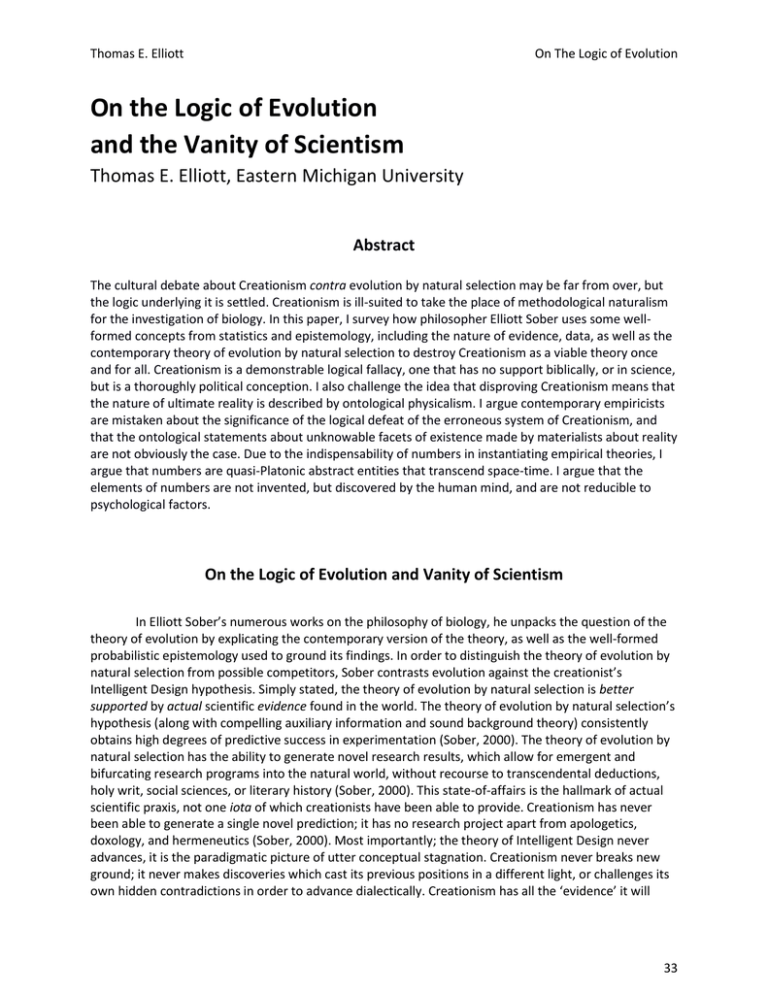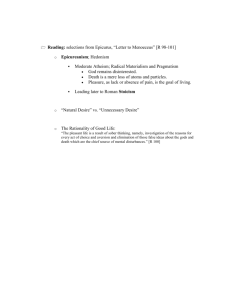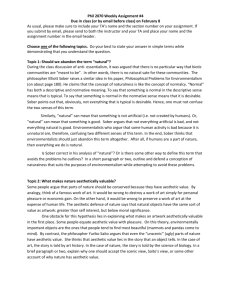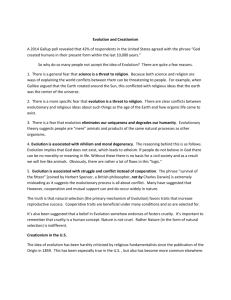On the Logic of Evolution and the Vanity of Scientism Abstract
advertisement

Thomas E. Elliott On The Logic of Evolution On the Logic of Evolution and the Vanity of Scientism Thomas E. Elliott, Eastern Michigan University Abstract The cultural debate about Creationism contra evolution by natural selection may be far from over, but the logic underlying it is settled. Creationism is ill-suited to take the place of methodological naturalism for the investigation of biology. In this paper, I survey how philosopher Elliott Sober uses some wellformed concepts from statistics and epistemology, including the nature of evidence, data, as well as the contemporary theory of evolution by natural selection to destroy Creationism as a viable theory once and for all. Creationism is a demonstrable logical fallacy, one that has no support biblically, or in science, but is a thoroughly political conception. I also challenge the idea that disproving Creationism means that the nature of ultimate reality is described by ontological physicalism. I argue contemporary empiricists are mistaken about the significance of the logical defeat of the erroneous system of Creationism, and that the ontological statements about unknowable facets of existence made by materialists about reality are not obviously the case. Due to the indispensability of numbers in instantiating empirical theories, I argue that numbers are quasi-Platonic abstract entities that transcend space-time. I argue that the elements of numbers are not invented, but discovered by the human mind, and are not reducible to psychological factors. On the Logic of Evolution and Vanity of Scientism In Elliott Sober’s numerous works on the philosophy of biology, he unpacks the question of the theory of evolution by explicating the contemporary version of the theory, as well as the well-formed probabilistic epistemology used to ground its findings. In order to distinguish the theory of evolution by natural selection from possible competitors, Sober contrasts evolution against the creationist’s Intelligent Design hypothesis. Simply stated, the theory of evolution by natural selection is better supported by actual scientific evidence found in the world. The theory of evolution by natural selection’s hypothesis (along with compelling auxiliary information and sound background theory) consistently obtains high degrees of predictive success in experimentation (Sober, 2000). The theory of evolution by natural selection has the ability to generate novel research results, which allow for emergent and bifurcating research programs into the natural world, without recourse to transcendental deductions, holy writ, social sciences, or literary history (Sober, 2000). This state-of-affairs is the hallmark of actual scientific praxis, not one iota of which creationists have been able to provide. Creationism has never been able to generate a single novel prediction; it has no research project apart from apologetics, doxology, and hermeneutics (Sober, 2000). Most importantly; the theory of Intelligent Design never advances, it is the paradigmatic picture of utter conceptual stagnation. Creationism never breaks new ground; it never makes discoveries which cast its previous positions in a different light, or challenges its own hidden contradictions in order to advance dialectically. Creationism has all the ‘evidence’ it will 33 Thomas E. Elliott On The Logic of Evolution ever require, in perpetuity, derived via tortuous reasoning appropriated from 1st century CE mystics, and 19th century natural theologians. Creationism relies on faux-scientific bafflegab mixed with spurious scriptural hermeneutics, and caps itself off with the opaque assertion of the Lord’s ultimately inscrutable Will. This dissimulating mauvaise foi is prima facie not science; creationism bares no resemblance to the scientific method which emerged in the last four centuries of the Common Era. Provisionally, a ‘good’ science’s state of constant becoming in self-unfoldment is how actual fields of scientific inquiry keep themselves aloft. If a science does not make relevant advances on its subject matter by repeatable confirmation of testable hypothesis, it shrivels into dust. In other words, science needs to constantly validate its theories with auxiliary observations, instantiation of probable background theories with explanatory power, and repeated demonstrations of unexpected phenomena. Science is not in the game of formulating likely explanations of readily observable phenomena, but actually predicating the unlikely. For instance the highly unlikely, yet observationally confirmed ‘tree of life’ hypothesis (Freeman, 2003). The ‘tree of life’ is the complementary theory of evolution by natural selection that separates Darwinian evolution from its historical scientific competitors (i.e. Lamarckian evolution), which stipulates that all organic life descended from a single biological entity (Freeman, 2003). “The cell theory and theory of evolution predict that all organisms are part of a genealogy of species, and that all species trace their ancestry back to a single common ancestor.” [Italics added] (Freeman, 2003) Biologists have illustrated the concept of a universal phylogeny by uncovering “the sequence of ribonucleotides in a molecule called SSU RNA that is found in all cells.” [Italics added] (Freeman, 2003) If scientific inquiry is unable to generate these types of positive research results from unlikely predictions, then they succumb to the quietus of phrenology and other failed (or pseudo) sciences, and no one seriously takes them back up again (Sober, 2000). The theory of Intelligent Design is ultimately a spread of formal logical fallacies; Intelligent Design is a false dichotomy which compares the wrong objects and an inductive argument from analogy where the objects are not sufficiently analogous. Sober demonstrates the logical rigor of evolution by natural selection not by ruthlessly questioning the veracity of the historicity of the Bible, or by ridiculing creationism’s absurd contemporary mouthpieces, or by taking on creation myths (in these works he never mentions the book of Genesis). Sober principally demonstrates this by deconstructing the faulty logic of 19th century creationist thinker William Paley. Paley contrasts Intelligent Design not against the theory of evolution by natural selection (which Darwin wrote about 30 years after Paley wrote his Natural Theology), but against pure, roiling, random chance. Paley has the same philosophical enemy that St. Paul does; the ancient metaphysical system of Epicurus (Sober, 2008). St. Paul thought of the hated Epicureans as positing the emergence of our infinitely variegated natural world out of the pure vicissitudes of chance physical assemblage of insignificant atoms (Wentworth DeWitt, 1954). St. Paul referred to ‘atoms’ in this pejorative sense in his Epistle to the Galatians as “weak and beggarly elements.” (Wentworth DeWitt, 1954) Atomism was for Epicurus a thesis against the existence of Platonic ideal forms, the theological determinism of his day, and the Aristotelian unmoved mover (O’Keefe, 2005). Without ever explicitly invoking his name, St. Paul vigorously denounces Epicurean philosophy, alleging that Epicurus’ system was skeptical (in the jaded contemporary sense) and rooted in hedonistic nihilism, without recourse to the indifferent (possibly nonexistent) gods (Wentworth DeWitt, 1954). This was St. Paul’s reactionary reading of sayings of Epicurus such as “If the gods listened to the prayers of men, all humankind would quickly perish since they constantly pray for many evils to befall one another.” (Connor, 1993) It is within the philosophical context of St. Paul’s straw-man of Epicurus that Paley famously compares biological entities with a pocket watch found on a lonely heath. (Sober, 2008) Paley postulates from their seemingly analogous ‘irreducible complexity’ that they both (the biological organism and the watch) must have been similarly designed by a benevolent creator’s ingenious architectonics, and not the corollary of blind forces of 34 Thomas E. Elliott On The Logic of Evolution Epicurean chance. Paley’s ‘watchmaker argument’ has become a perennial trope in the minds of contemporary apologists of creationism, who think of evolution by natural selection as nothing other then St. Paul’s reactionary account of Epicureanism. Unfortunately for Paley, the theistic argument from design was thoroughly logically razed before he even had the chance to write his formulation down. Notorious atheist, British Empiricist, and rascal, David Hume (in his Dialogues Concerning Natural Religion), set out the initial logical defeat of the analogical argument for God’s existence from design. Historically, Christian thinkers investigated questions concerning biology through the idea of ‘theological naturalism’, which is the notion that God is an unfathomably wise engineer, whose transcendent fingerprints mysteriously cover the divine order of nature (Sober, 2008). Natural theologians held that through the intense naturalistic scrutiny of the world you would simultaneously uncover the ‘Book of God’s Works’, providing proof of God’s indubitable existence (Sober, 2008). Hume thought of the design argument for God’s existence by naturalistic theology as a pitifully weak inductive argument from analogy. In his Enquiry Concerning Human Understanding, Hume thought (along with ancient Pyrrhonist skeptical thinkers and some moderns) inductive inference was decisively problematic to begin with; inductive logic is not deductive logic, so induction cannot guarantee the truth of its conclusions. Philosopher of science Karl Popper says of this problem “I hold with Hume that there simply is no such logical entity as an inductive inference; or, that all so-called inductive inferences are logically invalid and even inductively invalid.” (Popper, 1953) Not only do these philosophers think of induction as inherently illogical (despite its prevalence in scientific and everyday thinking), but that inductive inference was altogether illusory. The logical standard for soundness in deductive sentential logic is that the truth of the premises guarantees the truth of the conclusion, or a “valid inference from necessary premises” (Mautner, 1996). Hume, no doubt wracked by his comprehensive and overwhelming skepticism, insisted induction should be held to the same standard of logical verification deductive logic is. Hume thought the truth of inductive inferences must entail the truth of their conclusions as well, and that the conclusions must be truth preserving, as opposed to merely ‘probable’. Hume believed that because you found probable results from induction, that you couldn’t also be sure that some aspect of being wouldn’t oscillate overnight; your conclusions couldn’t definitively be shown to be absolutely correct, following from necessary premises. Granting it is at least intuitively the case that because you’ve seen nothing but black crows, the natural inductive inference that ‘all crows are black’ is fallacious, because there could be a day-glow pink crow somewhere just waiting to disrupt your chain of induction. Paley’s ‘watchmaker argument’ has the identical deficits, the creationist affinity argument founders as an inductive argument, because it is simply too weak to hold true of its own accord. By definition, inductive arguments cannot guarantee the truth of their conclusions from their premises. Although Paley didn’t expressly formulate his argument in these terms, Sober recasts Paley’s ‘watchmaker argument’ into syllogism thusly; Object A has property P. Object A and object T are similar to degree N. N=================================== Object T has property P Paley utilizes this logic to say the watch is analogous to the vertebrate eye, and can be thought of as an a posteriori teleological proof from Intelligent Design; blind organization by complete Fortuna couldn’t be responsible for something so intricately composed. The creationist argument’s crux is this inductive analogy between biological entities and artifacts (Sober, 2000). However, the actual problem with this 35 Thomas E. Elliott On The Logic of Evolution inductive argument is not as Hume or Popper suggests (the deductively invalid construction); the problem is that (from empirical observation); watches and biological entities couldn’t be more antithetical objects to one another. The watch excretes nothing, it requires no transformation of chemical energy, watches have never been observed breeding, watches do not regulate their core temperatures, and they cannot be self-reflective, and so on. This alleged analogy has no affinity between its referents, and thus the argument from affinity fails. Does Paley fare any better when his argument from design is reformulated not as an argument from analogy, but on a probabilistic formulation? If one compares the theory of Intelligent Design with mindless random chaos, Intelligent Design is clearly the more likely solution; it will win out over pure randomness every time (in terms of sheer likelihood). The likelihood of arriving at the complex variegated natural world by amaurotic forces purposelessly combining and recombining in the void with a dearth of possible teleology isn’t zero, it is just vanishingly remote. Paley’s design argument is reformulated by Sober as a likelihood construction thusly; O: the watch has features G1 ... Gn. W1: the watch was created by an Intelligent Designer W2: the watch was produced by a mindless chance process Pr (O/W1)>>Pr (O/W2) This reformulation clearly presents the false dichotomy. Paley’s argument fails on the probabilistic reframing because it will always be more likely than chance, but the real comparison is not between Intelligent Design and the straw-man of Epicurean metaphysics, but between different theories, one which makes novel predictions advancing research programs with unlikely outcomes, and one which makes no testable claims whatsoever. Creationism in comparison to the theory of evolution by natural selection is the real comparison, not creationism to St. Paul’s polemical caricature of Epicurean chance. Evolution by natural selection categorically does not operate randomly; natural selection is a thoroughly ‘nonrandom’ process, while genetic drift and mutation are indeed ‘unguided’ (Sober, 2011). “Natural selection occurs when there is heritable variation in fitness.” (Sober, 2000) Traits are passed on, which are ‘naturally’ selected based on the trait’s fitness values for reproductive survival in previous human environments, which emerge from mutation, genetic drift, and gene flow(Sober, 2011). Natural selection is categorically not a random process at all, but one based on non-random selection pressures on the fittest traits for reproduction from amongst the set of randomly generated and significantly constrained variables (Sober, 2011). Pocket watches clearly have the mark of an intelligent designer behind them… a human being, who constructs them to be nearly perfectly suited to function as mechanical chronometers. Biological entities, however, have no such perfection; they are often ill adapted, making due with the available material, not being endowed with ‘the best of all possible’ adaptations, but just the possible adaptations (Sober, 2008). This slightly counter-intuitive, nonperfecting, non-teleological feature of evolution by natural selection makes it even more likely to be the case, as a benevolent engineer intelligently designing the beings under his watchful care would have made them to be perfectly adapted to their environments (or else one cannot maintain His Omnibenevolence). The notion of beings being created to suit their environments is clearly at odds with the imperfect inheritance and temporal progression actually observed in the natural world (Sober, 2008). Imperfect adaptations of biological organisms raise the ‘no-designer-worth-his-salt’ objection to Intelligent Design (Sober, 2008). 36 Thomas E. Elliott On The Logic of Evolution If there were an intelligent, good, all-powerful being somehow guiding natural selection, ordering the appearance of mutation, or simply designing the beings of earth itself in their entirety from the ground up, would it really give such an inefficient system of digestion to rabbits? Surely it is a terrible design oversight from an engineering point of view that the rabbit must continuously eat partially digested feces in order to extract the maximum nutritional content from its food. Biologist Richard Dawkins, in The Blind Watchmaker describes the exterior mammalian male uro-genital system as an imperfect adaptation, and that its externalization over time was clearly progressive (Dawkins, 1986). There is also the example which so distressed Darwin himself; the horror of the wasp who lays its eggs inside a living caterpillar, which is deliberately paralyzed in the process, so the wasp larvae can consume the animal from the inside out, at their leisure (Sober, 2008). Examining these aspects of nature, one is likely to picture the creator God as a maleficent, ironic, or careless engineer, where wallowing ruthlessly in gore is the way life is intended to persist. Observation of the brutality of nature is surely a challenge to the idea of a caring creator’s invisible guiding hand. One would think in order to preserve a holy God; one’s theology would allow evolution by natural selection to do the unbelievably grizzly and bizarre work of propagation and alteration, so God will stay a spiritual entity worthy of veneration. Theology should be concerned with unpacking the divine unity of the mystical godhead represented in the figure of Christ (for instance), and not scientific epistemology, or how to make God the malicious shift-supervisor over this murderous world of bloody tooth and claw. In-the-last-instance, if the God of the Bible has some sort of ontological priority, then those who follow the Lord know that His ways are purposefully opaque! A mysterious and poetic Deus Absconditus is obviously not compatible with the data driven apparatus of scientific evidence. Results like these firmly establish ‘methodological naturalism’ as the foundational ontology of biology, as instantiated and advanced by the theory of evolution by natural selection. However, does this epistemic soundness and ontological ground entail that ‘materialism’ is the ultimate metaphysical system as well? Does evolution’s success over its naturalistic theological competitors show conclusively that it is impossible for there to be the ineffable, gods and goddesses, the infinite, or the mystery of being? As a result of there being no credible scientific evidence that evolution by natural selection is preserved by a teleological hand guiding mutation, and so on… does this mean that all beings as they exist, exist exclusively as motion and matter within a positively charged void, as such? In other words; does the sound scientific evidence for the methodological naturalism undergirding evolution flow across entailment into ontological materialism? Does naturalism in biology actually entail atheistic scientism metaphysically? Are there no entities which exist such that their existence in-themselves entails that physicalism and naturalism are indeed false? (Sober, 2011) Unfortunately for the pious acolytes of the nihilistic world-picture of scientism (which is the grandiose metaphysical claim that ultimate reality is empirical in nature and therefore ontologically physicalistic) there is at least one demonstrable counterexample which transcends space-time, is mind independent, and that material science finds utterly indispensable (Sober, 2011; Quine, 1960). As Pythagoras of Samos (one of the first philosophers of the West) might have said; numbers are indeed such mind-independent, abstract ontological entities, which transcend space-time. In a preserved fragment, Philolaus the Pythagorean said “number is the sovereign and autogenic force which maintains the eternal permanence of cosmic things.” (Philolaus, 1987) Human beings discover the elements of mathematics as opposed to invent them; the Pythagorean Theorem is true regardless of the existence of matter, it is similarly true regardless of the existence of minds to discover it, if we all die, the Pythagorean Theorem is still ‘true’. These mathemes are invariant entities with-in becoming, characterized by both possible and actual being, which emerge as common property of mind after their initial discovery. In-the-last-instance it is correct to assert numbers do not ‘exist’ as we generally inclined to think of an object with ‘existence’. Numbers indeed lack existence in the way we think of mind- 37 Thomas E. Elliott On The Logic of Evolution dependent ontic concreta (taking up space, having temporal duration, persisting until physical disintegration, recombination, and so on). However, the elements of mathematics ‘exist’ in a seemingly quasi-platonic, infinitely invariant, and abstract manner. There is probably no pure Platonic zone of selfexistent, perfect forms of numbers; numbers are platonic in a weaker sense, as abstract ontological invariants which persist throughout time. Numbers are not merely the expedient creations of human intellect for their utility, but real abstracta. Numbers are not ontic beings, and yet, they have a categorically non-trivial and intrinsic relation to the scientific study of the universe, one which transcends the arbitrary symbols we affix to them. Philosopher of science, and psychologist Willard van Orman Quine (repudiating his former view) found abstract objects are not as easily dispatched with as he would have wished (Quine, 1960). Unfortunately, it is impossible to simply dispense with abstract objects with a wave of the hand, and still have constant, indispensible recourse to mathemes (in the form of numbers, sets, classes, and so on) for the instantiation of our physical sciences (Quine, 1960). If physics itself has recourse to an indispensible set of abstract ontological entities, then clearly not every entity within being is a reducible ‘special case’ of physics. The physical sciences are instantiated in part by quasi-platonic abstract entities, which are independent of humanity’s brief inquiry into the infinitely expanding logarithmic mysteries of the κόσμος. 38 Thomas E. Elliott On The Logic of Evolution Works Cited Dawkins, R. (1986). The blind watchmaker. New York, NY: Norton. Connor, E. M. (1993). The essential epicurus: letters, principal doctrines, vatican sayings, and fragments. Buffalo, N.Y.: Prometheus Books. Freeman, S. (2003). Biology and the tree of life. In Biological science. Upper Saddle River, NJ: Prentice Hall, Inc. http://wps.prenhall.com/esm_freeman_biosci_1/7/1946/498193.cw/index.html Mautner, T. (1996). Deduction. A dictionary of philosophy ( 2nd ed., ). Cambridge, Mass.: Blackwell Publishers. O'Keefe, T. (2005). Epicurus. In Internet encyclopedia of philosophy. Retrieved from http://www.iep.utm.edu/epicur/ Philolaus. (1987). Fragments. In K. Sylvan Guthrie (Ed.), The pythagorean sourcebook and library: An anthology of ancient writings which relate to pythagoras and pythagorean philosophy. Grand Rapids, MI: Phanes Press. Popper, K. (1953). The problem of induction. seminariodeepistemologia, Retrieved from http://seminariodeepistemologia.wikispaces.com/5. Popper, the Problem of Induction Quine, W. V. (1960). Word and object. Cambridge: Technology Press of the Massachusetts Institute of Technology. Sober, E. (2000). Philosophy of biology. (2nd ed.). Boulder, CO: Westview Press. Sober, E. (2008). Evidence and evolution:The logic behind the science. Cambridge, UK: Cambridge University Press. Sober, E. (2011). Evolution without naturalism. In J. L. Kvanvig (ed.), Oxford Studies in Philosophy of Religion Volume 3. Oxford University Press, pp. 187-221. Wentworth DeWitt, N. (1954). St. paul and epicurus. Minneapolis, MN: University of Minnesota Press. 39



